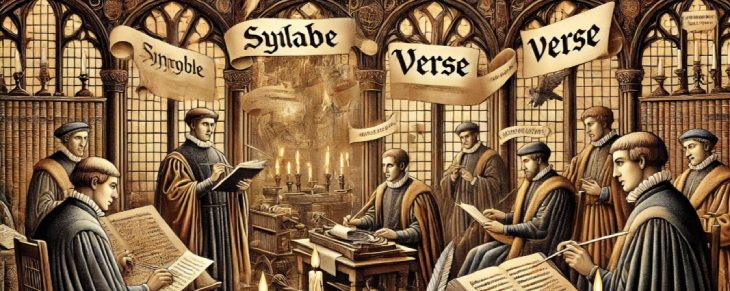In English, lines of poetry are referred to as "lines," while in French, the term "vers" is used. Interestingly, English also uses the word "verse," but it often describes poetry as a whole or specific stanzas. During the Middle Ages, English poets had access to multiple terms to define the fundamental units of poetry. In Latin, "versus" originally meant a metrical line but later extended to refer to entire poems. French and English usage of "vers" initially followed this meaning, emphasizing the rhythmic and rhyming patterns that marked the structure of poetry.
Words gain and change meanings over time, often through processes like metonymy, where the name of a related or associated concept is transferred to a new idea. The term "line" in English, for instance, comes from the physical lines scribes would draw on manuscripts to guide their writing. These graphic lines became synonymous with the units of text written on them. By the 15th century, French began using "ligne" to describe both graphic lines and metrical lines. In a similar process, "vers" evolved in English and French to represent both the form of poetry itself and the structural units it was composed of.

For a long time, poets focused on writing poetry without necessarily naming its individual metrical units. In Middle English, terms like "baston" and "staf" briefly appeared as descriptors for metrical lines but often also referred to stanzas. The word "vers" was commonly used when quoting Latin poetry or biblical texts, but rarely applied to English poetry. Chaucer, for example, used "vers" conventionally for Latin quotations and "line" to describe written or graphic lines. However, he did refer to his own metrical lines as "vers," likely influenced by his French literary background. In "Troilus and Criseyde," Chaucer used "vers" to mean "line" rather than "stanza," reflecting his metrical precision.
In the 15th century, poets like James I of Scotland used both "versis" and "linis" interchangeably to describe their metrical lines. This reflected the dual influence of French and English terminology in poetic discourse. By contrast, John Lydgate, another prominent poet, primarily used "line" to refer to his own work, reserving "verse" for Latin poetry. His descriptions often portrayed his lines as simple "black lines" of ink on a page, a humble metaphor for his craft.
Over time, "line" became the dominant term for metrical units in English poetry, while "verse" shifted towards describing stanzas or poetry in general. This transition was likely influenced by the growing association of "verse" with musical forms, such as psalms and songs. By the 16th century, "verse" commonly referred to the non-repeating sections of a song, and this meaning extended to poetry. As a result, "line" solidified its role as the primary term for metrical units in English poetry.